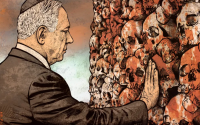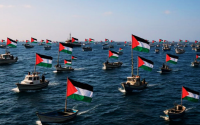22 July 2005Tom Turnipseed
Ecocide means destroying our ecosystem by actions of the human species. Human activity like war and the profligate use of our ecosystem’s resources is ecocidal.
War’s destruction of life is a stark example of ecocide. War is a crime against God and nature. Usually motivated by greed and the desire for the spoils of empire, war is often glorified as God’s will. Leaders of both sides in our present never-ending war on terror call on God to help wage war and bring victory over “evil” enemies, asking God to bless the violation of his sixth Commandment to us, “Thou Shalt Not Kill”.
Though Islam and Christianity are both derived from the same God of the prophet Abraham, religious fundamentalist leaders on both sides declare the terror war to be holy and heroic. They justify the killing by invoking the Almighty to sanction the violence and grant them the victory.
The Christian tradition of God as the warrior began in A.D. 312 with the Roman Emperor Constantine. After a major victory in battle against legions of his brother-in-law, Constantine said he had prayed for divine help before the engagement and then had a vision of a cross in the sky above his soldiers as they marched into the fray. This mystical event led to his Christian conversion.
Christianity was declared the religion of the Roman Empire by Constantine, and the image of Christ as the Prince of Peace became conveniently interchangeable with Christ as the warrior God. Previously, the Roman Empire had persecuted the Christians because they were pacifists, taught not to serve in the military or use violence against others.
It had been unlawful for a Christian to be a soldier in the Roman army, but Constantine's conversion abruptly allied Christianity with Rome’s military and by A.D. 416 it was compulsory for all Roman soldiers to be Christians. Constantine's army carried a cross as a standard that was a spear with a bar across it, exchanging the symbol of Jesus' death as an innocent victim of oppression for a symbolic weapon of the oppressor. The church took up the sword, and Christian participation in many wars and crusades since has been done in the name of God. The nonviolent image of Christ the peacemaker was transformed into the martial God.
The church of the one who drove the moneychangers out of the temple also became the church of great power and wealth. Jesus’ social action against materialism and the marketplace in the house of the Lord led directly to the conspiracy to crucify him. However, churches now have amassed vast amounts of property and wealth. Individual congregants, preachers and politicians who boast that God has blessed them to have more than others seem to have forgotten that a homeless Jesus had “nowhere to lay his head”. Constantine’s conversion led to the church’s acceptance of state control of religion; the dominance of the wealthy and powerful; the veneration of war and the use of violence for the glory of God.
The Arabic word jihad is often translated as "holy war". According to Islamic scholars, the first use of the term “holy war" was by Europeans in the Crusades to refer to the war against the Muslims. These scholars point out that in the Koran and the teachings of the Prophet Mohammed, jihad’s primary meaning is an effort for the benefit of the community and self improvement. Jihad is a religious duty. Military action is only one means of jihad, and is very rare.
In the First Crusade the forces representing the Catholic Church of Western Europe captured Jerusalem in 1099 and slaughtered the population establishing Christian rule there. In 1187, a Muslim jihad led by Saladin recaptured the holy city of Jerusalem. Many Muslims blame crusaders for today’s hostile Western invasions, occupations and deaths of the faithful and the loss of the holy city of Jerusalem.
The concept of jihad has been hijacked by many political and religious groups over the ages in a bid to justify various forms of violence against the established Islamic order. Scholars say this misuse of jihad contradicts Islamic teaching and most calls for violent jihad are not sanctioned by Islam.
Some hard line Muslims would take back the leadership of the world from the materialists of the modern, decadent West. The present call for jihad by Islamic fundamentalists against the United States and its allies in our occupations of Iraq and Afghanistan is based on their struggle against the materialism and imperialism of our continuing foreign policy focus on the tremendous oil reserves of the Middle East.
The worship of materialism is ecocidal. Our economy is fueled by oil and other fossil fuels like coal. Burning fossil fuels creates excessive carbon dioxide in the atmosphere and is a principal cause of global warming, contributing to “more extreme weather, rising sea levels, changing precipitation patterns, ecological and agricultural dislocations and the increased spread of human disease." according to the leading climatologists in the US and UK. Despite overwhelming scientific and political support throughout the world for the Kyoto accords, designed to reduce such emissions, ecocidal U. S. policymakers refuse to support them.
World wide weather is becoming more extreme and the habitat of all forms of life is being destroyed by our ecocidal species. An article outlining the impact of this destruction, published in 2004 in the science journal Nature, was co-authored by 18 eminent scientists. These researchers, working independently in six bio-diversity rich regions around the world from Australia to South Africa, all have concluded that global warming will doom a million species by 2050.
As it is with war, it is ecocidal to raise global temperatures with human-induced carbon dioxide and other greenhouse gases that will send so many of Earth's land-dwelling plants and animals to extinction. For top-of-the-food-chain humans, ecocide could finally include our own extinction.
Tom Turnipseed is an attorney, writer and political activist in Columbia, South Carolina. For more information, go to www.turnipseed.net
http://www.commondreams.org/cgi-bin/print.cgi?file=/views05/0722-30.htm






